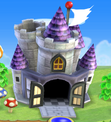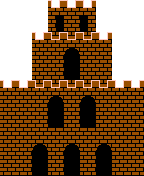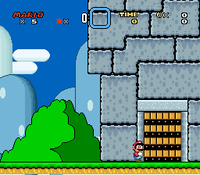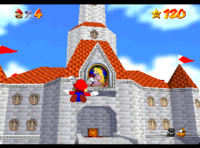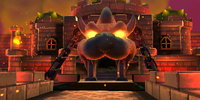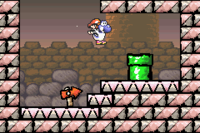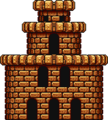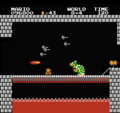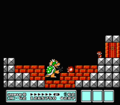Castle
- This article is about the type of level found throughout the Mario franchise. For the Super Mario Maker sample level of the same name, see Castle (level). For the Super Mario World musical composition of the same name, see Castle (theme).
- Not to be confused with Fortress.
Castles are a common type of level in the Super Mario franchise. Usually found at the end of each world, they are typically where the Mario Bros. and their allies confront the world's boss before moving on to the next world. Besides housing the boss, castles also tend to be rather hazardous places, with lava being more frequently found in these places than in most other areas in the series.
History[edit]
Super Mario series[edit]
Super Mario Bros.[edit]
In Super Mario Bros., all castles are made of red bricks (except for the one in World 6-3, which is gray), and all have the same basic shape. The castles can be found at the end of each world, but can also be found at the start of most worlds, aside from World 1, the first level of the game, and World 5, which starts with a fortress instead of a castle. Inside the first seven castles, the player will have to pass Fire Bars, lava and other assorted dangers in a grey brick interior, leading up to an encounter with a fake Bowser; defeating the impostor will allow Mario or Luigi to free a mushroom retainer, who informs them that their princess is in another castle. Only in World 8's castle do Mario or Luigi confront the real Bowser himself. Defeating him allows the plumbers to finally rescue Princess Toadstool. Smaller castle-like fortresses also appear at the end of every level (except for the fourth level of each of world, where a normal castle appears) and the beginning of each water or underground level, where Mario emerges from and enters a Warp Pipe. Castles appear to be a fortress stacked upon a larger section.
In Super Mario Bros. Deluxe, after completing a castle level, a cinematic is shown of Mario on the world map jumping repeatedly on the castle and causing it to collapse into rubble with a flag on top before moving on to the next world.
Super Mario Bros.: The Lost Levels[edit]
As Super Mario Bros.: The Lost Levels is almost identical in gameplay and design as to Super Mario Bros. in terms of gameplay, castles play the exact same role in this game, and even look almost exactly the same as they did in their predecessor. However, Bowser can now be confronted in two of the game's castles rather than simply the last one.
Super Mario Bros. 2[edit]
Castles are fairly sparse in Super Mario Bros. 2, with only one genuine castle making an appearance. This castle is located in the clouds, and is inhabited by the game's final boss, Wart, who had captured it from the King of Subcon. This castle is unique amongst most castles in the Super Mario franchise in that it looks more like a palace than a simple, lava-flooded citadel.
Super Mario Bros. 3[edit]
Castles (also known as "fortresses"[1]) in Super Mario Bros. 3 are found at the end of every world, but function completely differently than their predecessors do. Instead of housing the boss, each of the first seven castles will house one of the kings of the Mushroom World who had just been turned into an animal by one of the Koopalings. After speaking to the Toad accompanying the king, Mario/Luigi will board one of the Koopalings' Airships, where they will confront the Koopaling in battle. Defeating the Koopaling will cause Mario to fall into to the castle with the wand in hand, where he is greeted by the newly restored king and given a letter from Princess Peach.
The last castle - Bowser's Castle - is a typical citadel-esque castle like the original Super Mario Bros., containing lava and a variety of traps. The level ends with a battle against Bowser, after which the Mario Bros. can rescue Princess Peach and finish the game. In addition to castles, a new level type also called a Mini-Fortress appears which functions similarly to a castle: these fortresses always end in a battle against Boom Boom, who must be defeated in order to access some areas of each world.
Super Mario World[edit]
Like most of its predecessors, in Super Mario World, castles will be found at the end of each world, where Mario will confront the world's boss—usually one of the Koopalings. Yoshi cannot enter castles, as shown in the cutscene at the beginning of each castle; this forces Mario or Luigi to head to the boss without him. The technical reason of why this happens is that Yoshi is not compatible with some enemies inside the castles, notably Lava Bubbles.
After Mario has defeated one of the seven Koopalings, he will save a single Baby Yoshi and destroy the castle after exiting it. After the cutscene, Mario proceeds to the next world, giving the player a chance to save the game. The castles cannot normally be revisited in this game, being replayable only if the player holds both the and
buttons at the same time while on the castle on the world map.
Super Mario Land 2: 6 Golden Coins[edit]
In Super Mario Land 2: 6 Golden Coins, Mario is revealed to have a castle of his own, which had been invaded by Wario while Mario was rescuing Princess Daisy in Sarasaland. Mario must retrieve the 6 Golden Coins to unlock the door to his castle to stop Wario in order to reclaim what is rightfully his. The castle appears as the final level of the game, which was made dangerous because of Wario, and Mario confronts him at the end of the level.
Super Mario 64 / Super Mario 64 DS[edit]
In Super Mario 64 and Super Mario 64 DS, the main hub world is the Mushroom Castle. However, "castles" in the sense of the boss levels of the 2D Super Mario games do not appear in this game.
New Super Mario Bros.[edit]
After a long hiatus, Super Mario Bros.-esque Castles return in New Super Mario Bros. In this game, castles function similarly to how they had in prior 2D Mario games, being a dangerous, usually lava-flooded level that ends in a boss fight. A variety of boss enemies appear in these castles, from Petey Piranha to Bowser himself.
The beginning of the game also features Peach's Castle, which is struck by lightning and ignited in the opening cutscene. While Mario is running off to investigate this mishap, Bowser Jr. appears and kidnaps Peach, forcing Mario to abandon the castle and give chase to the Koopa prince. The castle thereafter serves as part of the scenery of the first world. It can also be seen in 1-1.
New Super Mario Bros. Wii[edit]
Castles in New Super Mario Bros. Wii work in a similar way to how they acted in the previous game. Mario and his allies traverse a dangerous, usually lava-filled area before having a rematch with one of the Koopalings; before the battle begins, Magikoopa appears and uses his magic to alter the battle in ways to make Mario's battle more difficult, such as increasing the size of Lemmy Koopa's ball or flooding Wendy O. Koopa's boss room. The final castle pits Mario and co. against Bowser, who is fought similarly to the original Super Mario Bros. Upon his defeat, Magikoopa appears again and uses his magic to turn Bowser giant, forcing the heroes to flee from the revived Koopa king for the rest of the stage.
Super Mario 3D Land[edit]
Castles also appear in Super Mario 3D Land. They once again serve as locations where bosses are fought, but unlike prior games are only found in four of the main eight worlds; one each in Worlds 1 and World 5, and two in World 8. The first two castles in the game are home to two Tail Bowsers, while both in World 8 are Bowser's castles, and pit Mario against the Koopa King himself. In the Special Worlds, castles appear more prominently; however, the majority of them are time trials, giving the player 30 seconds to complete. Dry Bowser resides inside the Special 1, Special 5, and Special 8 castles. Also unlike prior games, all the castles in this game have a giant Goal Pole at the end.
New Super Mario Bros. 2[edit]
Castles, along with Towers, return in New Super Mario Bros. 2, acting much like it did in the previous games. The Koopalings appear as the bosses only in the castles, as the Towers are occupied by Reznors. A Hidden Block containing a Super Leaf can be found at the end of every castle before a Koopaling battle, with the exception of Lemmy Koopa's castle, which has a Fire Flower in a Hidden Block at the end.
New Super Mario Bros. U[edit]
Castles and towers return yet again in New Super Mario Bros. U, acting much like it did in the previous New Super Mario Bros. titles. However, the path to the bosses are different; Mario and the other characters now have to shoot themselves out of a cannon to reach the airships the Koopalings reside in.
Super Mario Run[edit]
Five Castle courses appear in Super Mario Run: Bowser's Castle Hangout, Fire Bar Castle! Youch!, Rings of Fire!, Bowser's Bob-ombing Run, and Make the Cut!. Dry Bones usually inhabit Castles in this game. They include a boss fight against Bowser: the first three instead contain fake Bowsers, while the last is against the real Bowser. Bowser's Bob-ombing Run, the final course of the game, is entirely dedicated to an unique battle against Bowser in the Koopa Clown Car. On the course selection screen, Castles use the icon of fortresses. Bowser's Bob-ombing Run uses an icon for Bowser's Castle.
In Toad Rally, Green Toads, Blue Toads and Red Toads are part of the normal crowd.
In Remix 10, the course VS Bowser consists of the bridge for a Bowser battle. Every VS Bowser course except for the one in Area 30 contains a fake Bowser, with the one in Area 30 being Bowser's Castle and having the real Bowser.
Super Mario 3D World[edit]
Castles appear in Super Mario 3D World, similar to Super Mario 3D Land and the New Super Mario Bros. games. Only some bosses have castles before them, however - other bosses have either a different kind of stage before the boss fight, or have the whole stage dedicated to the boss fight. Once again, the Goal Pole can be found after defeating the boss, in contrast to most of the 2D Super Mario games. The seventh world of the game is also named "World Castle".
Super Mario Bros. Wonder[edit]
In Super Mario Bros. Wonder, castles (here called palaces) appear as the final level of every world except Shining Falls, Fungi Mines, and Petal Isles, similarly to castles in previous games. Every palace houses a Royal Seed and a boss fight with Bowser Jr. In the game's introduction, Bowser uses Wonder power to alter the palaces after transforming into Castle Bowser, turning them into green buildings filled with hazardous ooze that summons enemies. After the player defeats Bowser Jr., the palace is restored.
According to a Japanese article, the palaces were built in each world by their leaders, who ruled the Flower Kingdom together, as their home and as a way to protect the Royal Seeds. When they retired, the leaders left the palaces and most of them remained, while those in Shining Falls, Fungi Mines, and Petal Isles disappeared.[2]
Mario Kart series[edit]
Several of the racecourses in the Mario Kart series have had castles, either as part of the course or as part of the background. The most prominent castle in the series is Bowser's Castle, as it appears as one of the courses in every game in the series.
Peach's Castle has also had some appearances in the series. The Royal Raceway track of Mario Kart 64 features a castle that can be explored outside. In Mario Kart: Super Circuit's Rainbow Road, the castle can be spotted on top of Bowser's Castle, like in Paper Mario, in the background. In Mario Kart: Double Dash!!, it appears on Mario Circuit and vaguely on Mushroom Bridge, but also as part of the track's background. The back of Peach's Castle is featured in Mario Kart DS, on the Peach Gardens course. In Mario Kart Wii, the castle once again appears in the background of Mario Circuit. Mario Kart 7 also features Peach's Castle (once again on Mario Circuit), although this time it is a part of the track and the player is able to drive up a windy path inside of the castle. Mario Kart 8 features Peach's Castle in the courses Mario Circuit and N64 Royal Raceway.
Super Mario World 2: Yoshi's Island / Yoshi's Island: Super Mario Advance 3[edit]
Like in most other games, the castles in this game are found at the end of the World the Player is in. However, the creature found at the end usually does not intend to harm Baby Mario and Yoshi, until Kamek comes, and transforms it into a huge boss for the Player to fight, trying to slow down or even stop Yoshi from reaching Baby Bowser's Castle. Once the player gets to Baby Bowser's castle, even though it is guarded by Kamek, the player does not get to fight Kamek; instead, the player will fight Baby Bowser, powered up with Kamek's magic.
Super Mario RPG: Legend of the Seven Stars[edit]
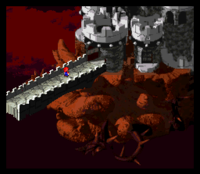
In Super Mario RPG: Legend of the Seven Stars, near the beginning of the game, Mario will go to Bowser's Keep to rescue Princess Peach from Bowser. Also, castle-like areas appear in some places.
Paper Mario series[edit]
Paper Mario[edit]
In Paper Mario, Bowser lifts his castle, and by extension Peach’s Castle, into the sky.
Paper Mario: The Thousand-Year Door[edit]
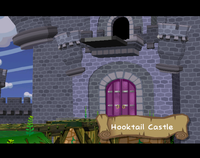
In Paper Mario: The Thousand-Year Door, Hooktail Castle appears in the first chapter of the game. Bowser's Castle also appears, but only serves as an interlude. The Thousand-Year Door's interior can also be considered a castle-themed location, since castle enemies such as Dry Bones appear.
Super Paper Mario[edit]
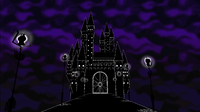
Super Paper Mario includes Castle Bleck. Bowser's Castle again appears only in the prologue cutscene, although Bowser claims a smaller castle in The Bitlands.
Paper Mario: Sticker Star[edit]
In Paper Mario: Sticker Star, Bowser's Sky Castle appears.
Paper Mario: Color Splash[edit]
In Paper Mario: Color Splash, Bowser's Castle is known as Black Bowser's Castle, due to Bowser being possessed.
Paper Mario: The Origami King[edit]
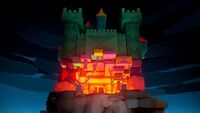
In Paper Mario: The Origami King, both Peach and Bowser's castles appear. The former is relocated to a distant mountain and turned into Origami Castle by King Olly, and it is restored to its original conditions after his defeat; the latter crash-landed into Shangri-Spa and is where the Green Streamer is located and Scissors is fought.
Mario & Sonic at the Rio 2016 Olympic Games[edit]
A Brick Block structure in the shape of a castle from Super Mario Bros. floating on a cloud appears as an obstacle in Golf Plus in the Nintendo 3DS version of Mario & Sonic at the Rio 2016 Olympic Games. It functions as a simple obstacle that does not let balls pass through with empty windows.
The Super Mario Bros. Movie[edit]
In The Super Mario Bros. Movie, Luigi can be seen running toward an almost run-down-looking castle while trying to escape from some pursuing Dry Bones after arriving at the Dark Lands as a result of him accidentally being separated from Mario while traveling through the mysterious pipe. When he enters the castle, he is captured by a group of Shy Guys.
Profiles[edit]
New Super Mario Bros. 2[edit]
- European Website bio: "The last level in each World is a Castle where you'll face off against one of Bowser's team of shifty types – keep going and you'll be on your way to the next cool World before you know it."
Gallery[edit]
- For this subject's image gallery, see Gallery:Castle.
The Bowser fight in Super Mario Bros.
The Bowser fight in Super Mario Bros. 3
Iggy Koopa's castle battle in Super Mario World
Names in other languages[edit]
| Language | Name | Meaning | Notes |
|---|---|---|---|
| Japanese | 城[3] Shiro お城[4] Oshiro キャッスル Kyassuru |
Castle | |
| Chinese | 城堡[?] Chéngbǎo |
Castle | |
| Dutch | Kasteel[?] | Castle | |
| French | Château[?] | Castle | |
| German | Burg Kastell Festung[?] |
Castle Castle Fortress |
|
| Italian | Castello[?] | Castle | |
| Korean | 성[?] Seong |
Castle | |
| Portuguese | Castelo[?] | Castle | |
| Russian | Замок[?] Zamok |
Castle | |
| Spanish | Castillo[?] | Castle |
Trivia[edit]
- In the 2010 version of Nintendo Monopoly, there is a Brick Block card that rewards the player with $100 for inheriting a castle.
- Every castle in the New Super Mario Bros. series has a Hidden Block next to the boss door, containing a power-up.
- In the Pikmin Adventure attraction of Nintendo Land, stage 14, "Out of the Darkness", features a structure at the start that resembles the castles in Super Mario Bros.
- In Super Mario Galaxy 2, the Bowser levels at the end of Worlds 2 and 4 are represented in the map as castles.
- In the castle theme of Super Mario Maker, if the bridge is taken down, all enemies on screen will fall into the lava (even if they are not placed on the bridge).
- In the multiplayer modes of Super Mario Maker 2, if the player is in an area with the Castle theme when the course is cleared, the castle clear fanfare will play, even if the end of the course is not in the Castle theme.[5]
References[edit]
- ^ Super Mario Bros. 3 English instruction booklet, page 25.
- ^ (January 12, 2024). 全て合わせて120以上。マリオたちが冒険するフラワー王国のいろんなコースをご紹介。【ワンダーの世界へ Vol.12】 nintendo.co.jp. Retrieved January 12, 2024. (Archived January 12, 2024, 16:04:25 UTC via Wayback Machine.)
- ^ Super Mario Bros. 3 Japanese instruction booklet, page 24.
- ^ Super Mario World Japanese instruction booklet (fold-out)
- ^ DarkX2 - Nintendo Gameplays (October 20, 2019). Super Mario Maker 2 Multiplayer with Friends!. YouTube. Retrieved October 22, 2019.

